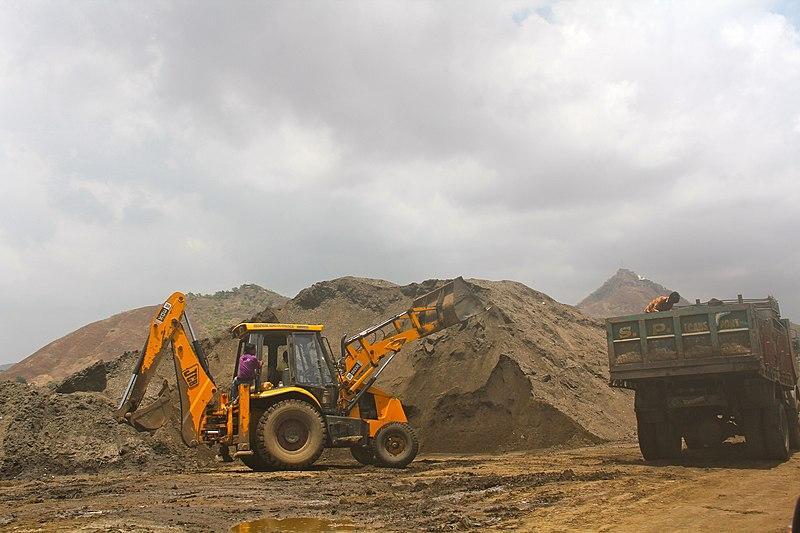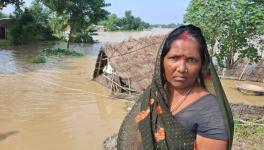Bihar: Failure to Stop Illegal Sand Mining During Rains Ruining Ecosystem of Several Rivers

Sand mining in India. (Image Credit: Wikimedia Commons)
Patna: Though sand mining has been banned on paper during ongoing monsoon season in compliance with the order of the National Green Tribunal, large-scale illegal sand mining is going on causing damage to river beds and its ecology. It is also changing the morphology and natural flow of rivers. Unaccounted huge volumes of sand being extracted in Sone, Ganga and other rivers, mainly through machines in broad daylight as well as at night, have led to huge pits that are bad for river health.
In recent months, the state government initiated several measures, including crackdown on the powerful sand mafia to check illegal mining but has failed to stop it. The government has now chalked out an action plan against the sand mafia. Bihar Police ‘s Economic Offences Unit (EOU) has prepared a list
of 55 sand mafia who are accused of involvement in illegal sand mining in 13 districts -- Patna, Bhojpur, Gaya, Saran, Bhagalpur, Rohtas, Aurangabad, Arwal,
Khagaria, Banka, Nawada and Jahanabad. Interestingly, the names include a ruling Bharatiya Janata Party (BJP) MLC, an opposition Rashtriya Janta Dal (RJD) MLC, some former MLAs, a journalist in a Hindi daily and dozens of criminals-turned-contractors and local politicians.
According to police sources, the EOU has asked Superintendent of Police (SP) of all these districts to file a charge sheet against those named in the list.
During the rainy season (June 15 to October 15), when officially sand mining is
banned, an artificial shortage of sand is created that leads to its high rate. This is a boon for those involved in illegal sand mining, which has become a big source of minting money for a few, causing a big loss to the state exchequer as well as the river ecosystem.
Ramakar Jha, a professor at NIT Patna, who is a river expert, told NewsClick said that powerful people, locally known as sand mafia, behind illegal sand mining have no concern for rivers or any rule. They have been extracting sand in a ruthless and unscientific way that badly affects the riverine ecosystem, its natural flow, changing course and aquatic habitats.
Sone river’s yellow sand is considered best quality, and is in high demand in Bihar and neighbouring states. This river has been bearing the brunt of mindless sand mining. On a daily basis countless trucks, tractors and dumpers loaded with sand leave different banks of Sone during this period. Similarly, a large number of sand-laden big boats from the Sone side are unloaded on the banks of river Ganga in Saran and Patna. Ganga’s sand is mostly grey in colour due to a mix of soil and is not used for construction. It is mainly used for
filling purpose but its demand is also high in the ongoing infrastructure projects.
This four-month ban on sand mining, therefore, is turning out to be a boon for illegal sand mining in the state, with the mafia selling sand at higher rates and raking in profits that are triple or four times higher.
Irrespective of the ban, rampant illegal sand mining has been going on across the state, allegedly in the full knowledge of the local authorities. There’s a strong nexus of local politicians, contractors, criminals, administrative officials including the police, say reports.
The sand mafia is said to fear no one. Contrary to government claims, most riverine belts are under their control. In the past over six months, there have been reports of more than three dozen incidents in which the sand mafia
attacked and injured police and local administrative officials. It appears that Illegal sand mining has become a part of an organised crime syndicate.
At several places not far away from river banks, the mafia have stored huge dunes that are loaded on to heavy vehicles at night. This unlawful process
has been going smoothly at the cost of rivers.
Another expert, who did not wish to be named, said sand mining was not bad if done in a scientific way. Mining cannot be allowed anywhere and any volume. There should be solid data about availability of sand at a particular location for mining. It should be regulated as to how deep and how much sand can be extracted, he added.
Illegal sand mining is particularly rampant in Sone, Kiul, Falgu, Chanan, Morhar,
Punpun and Ganga rivers.
According to a police report submitted to the Patna High Court in 2017, the sand mafia is a huge nexus between the local police, sand miners enjoying political clout and officials of the government's mines department. It further pointed out violations by the sand mining companies that were given sand mining leases, particularly in Patna.
"Complete connivance of state government officials, particularly those from the police, mining and transport department... the rules and laws on mining and the environment are merely reduced to paper…," the report said.
The writer is a freelance journalist based in Bihar.
Get the latest reports & analysis with people's perspective on Protests, movements & deep analytical videos, discussions of the current affairs in your Telegram app. Subscribe to NewsClick's Telegram channel & get Real-Time updates on stories, as they get published on our website.























